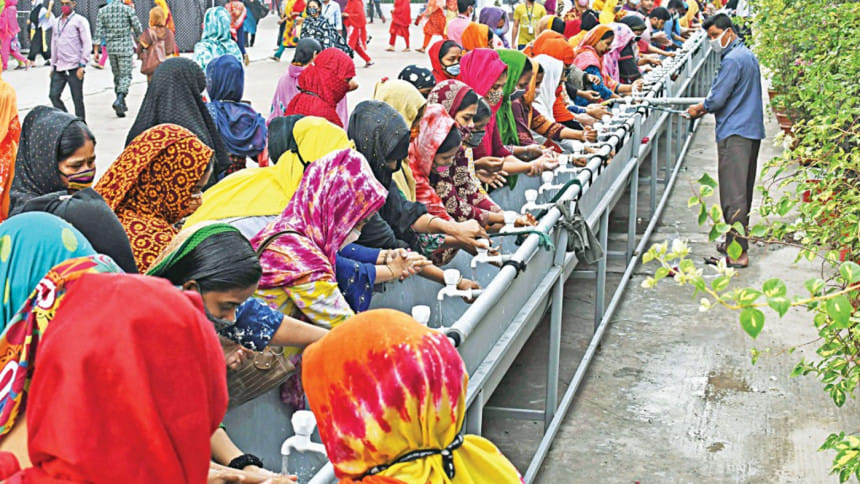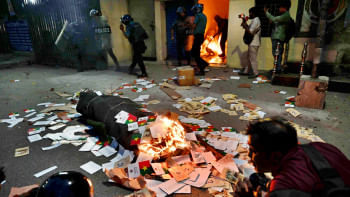‘Bouncing back better’ will come at a price

It has been around one year since the coronavirus pandemic began to bring about sweeping changes in our industry. It was February-March in 2020 when we first began to see fashion brands cancelling orders with their suppliers in Asia after concerns were raised that a novel virus from China could have major global significance.
A slow trickle of cancelled orders soon turned into an avalanche. Through spring and summer, orders dried up for many suppliers as global lockdowns in our key markets such as Europe and the US turned the tap off the demand for our key export—clothing.
There was a brief period where orders did pick up but, overall, the past 12-months have been as tough a period of trading as I—or any of my contemporaries—will ever encounter. The past year places the impact of the 2008 financial crash truly in the shade. These are unprecedented times.
The question is, what next? As I write this, we are no longer seeing the issue of cancelled orders (certainly not on the scale that we saw before). The issues now are smaller orders (perfectly understandable in the circumstances) and reduced unit prices (less acceptable). A shrunken market means more and more suppliers are fighting for the same orders, placing more downward pressure on prices.
I estimate that unit prices for RMG exporters in Bangladesh have fallen by around 5 percent in recent months. This is a huge drop in any industry, but in a sector where suppliers have already been struggling to pay the bills, it is potentially catastrophic.
None of this is sustainable. Early on in this pandemic, there was much talk among major brands of "building back better". Well now is the time to put these words into action, and to do this we must start with suppliers.
We cannot build back better with a supply chain that is still being decimated more than a year after the pandemic began. As suppliers, we all want to build back better. By building back better, I mean paying workers fairer wages and upgrading our factories to reduce their burden on the environment while supporting our customers with their climate commitments. That's what we want as suppliers, and I believe most of the industry shares our aspirations, if their public pronouncements are anything to go by.
So, what do we need to do to make this happen? What do we need to do to build back towards a fairer, more resilient and environmentally progressive industry?
The short answer to this is: money. Another phrase I have heard a lot in the past 12 months is that we need an industry "reset". That is all well and good but how will this reset happen and what will it entail? Any reset, as we all know, needs to be focused on sustainability. And for me, a key aspect of sustainability is partnerships. We as suppliers cannot reset the industry on our own. Suppliers and brands have to work together to develop and implement the tools and practices that will reset the industry on a more sustainable footing.
I reiterate—all of these cost money and money is the one thing suppliers simply do not have at the moment. Many suppliers in Bangladesh only survived the past 12 months because they received special protections from the government. Now that these bailouts have stopped, what will happen?
Already, we are seeing signs that our supply base is teetering on the brink. Recent reports in the media show that small and medium-sized garment factories across Bangladesh are struggling to stay afloat as orders dropped by about 30 percent. Moreover, this story is being replicated across the world—in China, Vietnam, Cambodia, Ethiopia, Indonesia, Sri Lanka and beyond.
In many cases, factories have not closed but they are only operating at 60 percent capacity or even less. Hence, thousands upon thousands of jobs are facing an extremely uncertain future.
In many cases, smaller and medium sized factories are being disproportionately affected by the impacts of the Covid-19 pandemic because they do not have the financial solvency of the big factories and also because many brands are opting to provide new orders to large factories which are better placed.
The thing to note here is that this may well be our new normal. There are no guarantees at all that our industry will return to the days of huge orders and the stability that such orders brought for factory owners. Many brands are scared to leave themselves exposed to the issues they faced previously when they had to cancel massive orders in the face of the pandemic. Shorter, more regular orders give them more flexibility but they bring their own challenges for suppliers.
In all of this, I keep coming back to the question: where is the money for our industry to bounce back better? Who will fund the necessary sustainability overhaul our industry so badly needs to make (and I am talking about both social and environmental sustainability here)? We know factories cannot afford it. We know that, in many cases, Asian governments cannot afford it, or are unable to commit more money to struggling businesses. So where will the money come from?
It could take years for our industry to recover from this pandemic. During these years, what will happen to sustainability issues? Can we keep kicking them down the road? Can we afford to keep doing that as our planet gets warmer?
Likewise, what will happen to our garment workers as we see more and more pressure being placed on downward prices? At what point are we going to bite the bullet of worker wages and when will we begin to move towards an industry that provides more security for workers so they can better navigate times of crisis like now?
Normally I like to offer solutions to the issues raised but, at present, it is not easy to see the light at the end of the tunnel. From a manufacturer's perspective, it has become clear to me that we all need to adapt to survive right now. With less orders, we may need to place more focus on areas of added value such as quality control, decreased through-time, increased flexibility and vastly reduced rejection rates.
Partnerships are also critical. The adversarial approach between brands and suppliers does not work, and this pandemic has highlighted that.
The only way forward I see is for brands and their suppliers working in partnership to decide on the industry they truly want to see over the next few years and the steps we all need to take in order to get there.
Some difficult but necessary conversations lie ahead.
Mostafiz Uddin is the Managing Director of Denim Expert Limited. He is also the Founder and CEO of Bangladesh Apparel Exchange (BAE).

 For all latest news, follow The Daily Star's Google News channel.
For all latest news, follow The Daily Star's Google News channel. 



Comments